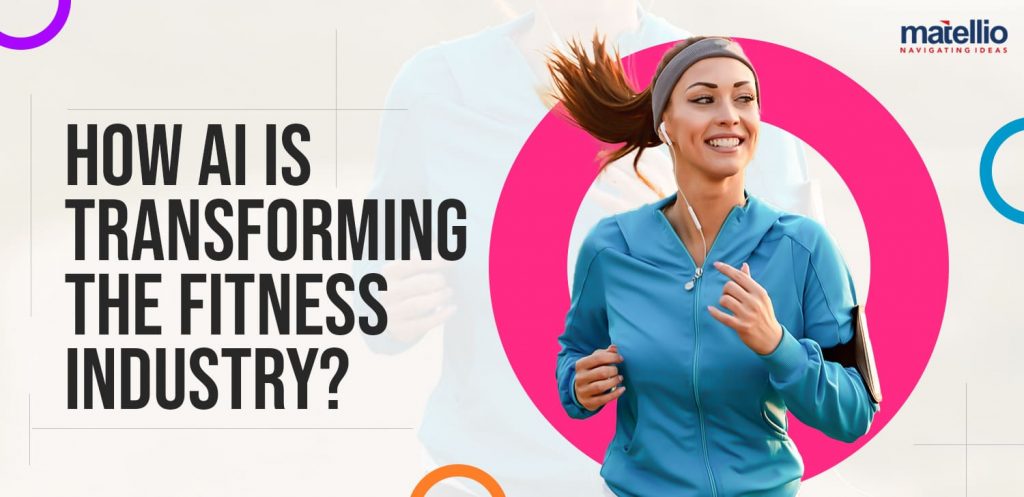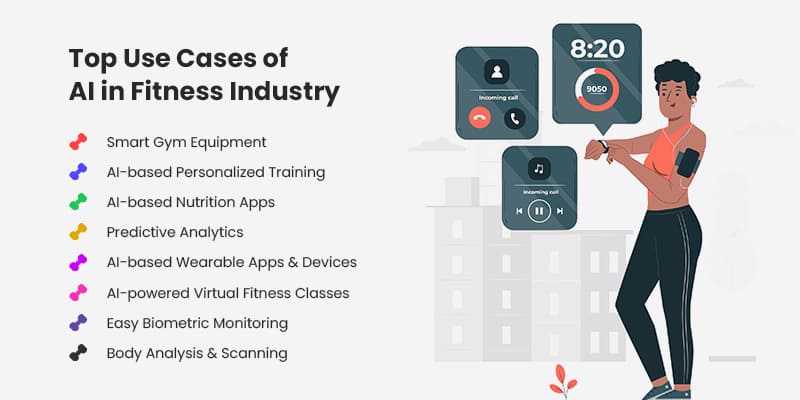
The fitness world is rapidly changing, and technology plays a significant role in transforming the industry. Among the most significant technological advancements in the fitness industry is using AI in health and fitness app development.
AI assists fitness enthusiasts in monitoring their progress, achieving their fitness goals, and making wiser choices regarding their general health and well-being. AI development services can change the fitness sector in ways that were previously imaginable, from building custom training programs to monitoring your dietary intake.
In this blog, we’ll examine AI’s main advantages and uses in the fitness industry and how it’s altering thinking about health and fitness.
So, let’s get started!
Why Are Fitness Apps Gaining Traction in 2023?
Nowadays, more people are looking to technology for advice on matters related to their health and fitness. Many companies have developed apps, wearable, artificial intelligence gym solutions, and other health and fitness app development solutions to assist those who want to stay active but lack the time or resources to commit to a gym.
According to the research, the worldwide fitness app development market was estimated to be worth USD 1.3 billion in 2022 and is projected to rise at a CAGR of 17.6% from 2023 to 2030.
AI fitness apps are quickly becoming a crucial solution for advancing the fitness industry. There are numerous ways in which it is influencing the future of the fitness industry.
Importance of AI in Fitness Industry!
Users can reach their fitness goals without visiting a gym thanks to AI-based capabilities in fitness apps. These days, various AI fitness apps with cutting-edge features are accessible to offer customers individualized experiences.
AI can process a wide range of data from sensors, wearable, cameras, and other connected devices, providing remarkable insights into workout sessions, such as the number of calories burned, the precision of the workout, and the amount of fat burned.
Many diet applications employ smart AI algorithms to determine how much calories are consumed each day depending on the foods and how much it burnt. Additionally, it determines how many calories and water the user should take based on the healthy weight goal that the user is trying to reach.
By offering more convenient and accessible training experiences, measuring physical activity, and giving individualized workout regimens, AI development services are transforming the fitness industry. Moreover, AI is being utilized to gamify fitness, make physical activity more enjoyable and engaging, and develop wellness initiatives emphasizing mental and emotional well-being.
Top Use Cases of AI in Fitness Industry!
Following are some top use cases of AI in the fitness industry: –

Smart Gym Equipment
Innovative artificial intelligence gym equipment can adjust resistance levels, provide customized workouts, and monitor advancement. Certain treadmills, for instance, employ powerful AI fitness apps to generate distinctive running regimens based on users’ goals and fitness levels.
AI-based Personalized Training
Personalized training with AI-based digital transformation services will be mainstream in 2023. Fitness coaches can build personalized training plans for each person using AI algorithms and machine learning techniques. To create a unique training regimen that fully utilizes each person’s potential, AI will examine their current level of fitness, goals, preferences, and progress.
With virtual fitness coaching platforms, these personalized training plans will be distributed, enabling users to get direction and assistance from their coach wherever they are in the world. With AI-powered custom healthcare software development and custom training, users will be able to reach their fitness objectives faster and more effectively than ever.
AI-based Nutrition Apps
AI is poised to revolutionize the nutrition industry and provide customized instruction. Users will be able to measure their food intake with the aid of AI fitness apps and get tailored nutrition advice based on their particular needs and objectives.
AI fitness apps will examine a person’s eating patterns and make recommendations for improvement. Individuals will also receive comprehensive information on the nutritional value of their meals from AI-powered nutrition coaching, making it more straightforward for them to make educated decisions.
Predictive Analytics
AI is used to predict users’ fitness goals and provide recommendations for achieving them. Some AI fitness apps, for instance, use predictive analytics to forecast users’ future levels of fitness and suggest strategies for achieving their goals. These predictive analytics tools help users stay on track and accomplish their fitness objectives more quickly and effectively.
Also Read – How is AI Impacting Predictive Analysis?
AI-based Wearable Apps & Devices
Wearable technology with AI in fitness industry will be more prevalent than ever in 2023. These gadgets will monitor a person’s fitness level, heart rate, and other vital signs, giving important information about their general health. AI fitness apps will analyze this data, offering users individualized feedback to help them make the most of their exercise routines and advance their general health. People can track their progress and change their workout regimens in real-time with wearable technology driven by AI development services.
Also Read – Important Factors to Consider for Wearable App Development
AI-powered Virtual Fitness Classes
With the aid of fitness app development company, virtual fitness classes, which have grown in popularity over the past several years, are expected to be even more engaging and valuable in 2023. Virtual fitness classes can monitor a student’s performance and offer customized feedback in real-time thanks to AI algorithms and machine learning techniques.
By enhancing their motions and form, people can minimize the risk of injury and increase the efficiency of their workouts. Additionally, AI-powered virtual fitness courses will be able to modify the level of difficulty of the workout per a user’s fitness level, ensuring they are consistently challenged and improving.
Easy Biometric Monitoring
AI technology can be used to monitor biometric data while exercising. Heart rate variability, blood pressure, oxygen saturation, and other measures can all be tracked biometrically. AI solutions can assist users in maximizing their exercises and avoiding injuries by tracking biometric data. AI fitness apps can advise people to work out at a lower intensity or take longer rest breaks if their heart rate variability falls noticeably. AI can deliver personalized feedback that can assist users more efficient in reaching their fitness goals by keeping track of biometric data.
Body Analysis & Scanning
Based on images gathered from different perspectives, AI technology can be used to build 3D models of a person’s physique. AI algorithms can examine these models to find the body parts that require strengthening or stretching to enhance performance or avoid injuries.
Body scanning can be used to monitor advancement over time. AI can offer tailored feedback on the efficacy of a training regimen by comparing 3D models collected at various intervals.
These new advances in AI technology in the fitness sector show how adaptable it is and how it can change how we think about fitness. AI offers fresh and creative approaches to improve overall health and well-being, reduce injuries, and maximize performance.
We anticipate seeing even more fascinating and original use cases develop in the fitness sector as AI technology advances.
Also Read – How To Develop A Medical Imaging Analysis Software Solutions?
Benefits of AI in Fitness Industry!
Artificial intelligence has a lot to offer the fitness industry. With AI-based health and fitness app development, many time-consuming tasks can also be automated, which is vital to customer support and onboarding. AI can decrease or partially prevent human error, which can sometimes be expensive.
The following are some benefits of AI in the fitness industry: –
Personalization
The potential to build personalized workout plans is one of AI’s key advantages in the fitness industry. An individual’s fitness level, interests, and goals can be considered when designing a personalized training plan using AI algorithms that evaluate data from fitness trackers and other devices. These plans may specify particular exercises, sets, and reps, as well as rest and recovery intervals.
Emotional Recognition
AI technology can recognize and address a person’s emotions during an exercise. Custom AI solutions can determine when a person is stressed, annoyed, or exhausted by examining facial expressions, body language, and other signs.
This technology can be especially beneficial for individuals who are new to exercising or who might be dealing with anxiety or other emotional difficulties while working out. AI can change the training program to relieve stress or frustration by responding appropriately to these emotions.
For example, AI might suggest a lower-intensity workout or a mindfulness activity if someone feels anxious. Alternatively, AI may advise a higher-intensity workout if a person feels energized and motivated.
The ability to recognize emotions can be utilized to monitor development throughout time. AI can offer personalized feedback on the efficacy of a fitness plan and recommend changes or tweaks to boost performance and general well-being by evaluating emotional responses during workouts.
Data Analysis
In the fitness industry, AI can improve data analysis. Large datasets from sources like fitness monitors, nutrition apps, and others help AI systems spot trends and insights that might not be obvious to people.
AI may find a link between a person’s sleep habits and their performance during a workout, enabling users to adapt their sleep schedule for better fitness outcomes. AI can help people make better decisions about their health by offering more profound insights into fitness and wellness.
Sleep Analysis
AI fitness apps can also be used to assess sleep habits and offer individualized advice on how to raise the quality of one’s sleep. AI algorithms can discover elements that may be impacting sleep, such as stress or poor sleep hygiene, by examining data from sleep trackers and other devices.
AI can make tailored suggestions for enhancing sleep quality based on this data, including changing nighttime rituals or implementing relaxing techniques.
Also Read – How to Develop a Sleep and Meditation App Like Balance?
Potential Challenges That AI Solves in the Fitness Industry!
The following is a typical procedure for hiring a team of dedicated developers: –
Many challenges impacting the fitness industry could be resolved using artificial intelligence (AI), which can also assist people in improving their performance and reaching their fitness objectives. Let’s look at the primary challenges AI addresses in the fitness sector:
Data Management
The fitness industry contributes a lot of data, including biometric data, exercise history, and dietary data. It might be challenging to manage this data, especially for trainers who work with numerous customers. Yet, with the aid of AI technology, this data can be managed and analyzed, and insights into trends and patterns may be gained to help with training plans and performance.
Feedback
The ability to provide each client with real-time feedback in a group environment can take time for trainers to do, although input is essential for fitness growth. The instructor may need help to give each student individualized feedback in a group fitness session, for instance, due to a large number of participants. On the other hand, AI technology can deliver immediate feedback on form, technique, and other elements of an exercise, enabling people to make modifications and maximize their performance in real-time. During exercise, an AI system can examine a person’s form, which can then offer suggestions on how to improve their form.
Additionally, the algorithm may deliver real-time data on parameters like heart rate, breathing rate, and calorie burn, enabling users to modify the intensity of their workouts to improve performance.
Preventing Injuries
Injuries are a frequent challenge in the fitness industry and can be brought on by several things, including using improper form or overtraining. Artificial intelligence (AI) technologies can evaluate biometric data to pinpoint vulnerable body parts and offer individualized advice to minimize the risk of harm and maximize performance.
Personalization
Building personalized training sessions catered to a person’s specific needs and tastes is one of the significant difficulties facing the fitness industry. There is indeed no such thing as a one-size-fits-all training regimen because everyone has distinct fitness goals, physical characteristics, and restrictions. Nevertheless, using biometric information, exercise history, and other data, AI algorithms can develop personalized training schedules to improve performance and reach particular objectives.
A training plan can be created using an AI algorithm that analyses a person’s body composition, including their height, weight, and body fat %, to help them reach the muscle mass they want. To design a plan that is customized to each person’s unique requirements and preferences, the algorithm can also use the person’s past workout data, including their preferred exercises and level of intensity.
Ultimately, AI technology can address many of the fitness sector’s issues. AI can assist people in maximizing their performance and achieving their fitness objectives by offering customized training routines, immediate feedback, injury avoidance, data management, and encouragement.
Conclusion
In 2023, AI is expected to transform the fitness sector completely. People will be able to reach their fitness objectives faster and more effectively than ever with AI-powered tailored training, nutrition counseling, wearable tech, virtual fitness courses, and rehabilitation tools. Individuals will receive individualized feedback and direction from AI, allowing them to maximize their workout regimens and enhance their general health. AI is paving the way for a healthier and more physically fit world, and the future of fitness is promising.
With the support of talented team of AI developers at Matellio, we can assist you with AI development services. Our expert engineers are fully versed in the artificial intelligence and machine learning integrations. We have built a number of well recognized health and fitness apps that have received outstanding reviews and operate well. For a free budget estimation and consultation, book a call.






